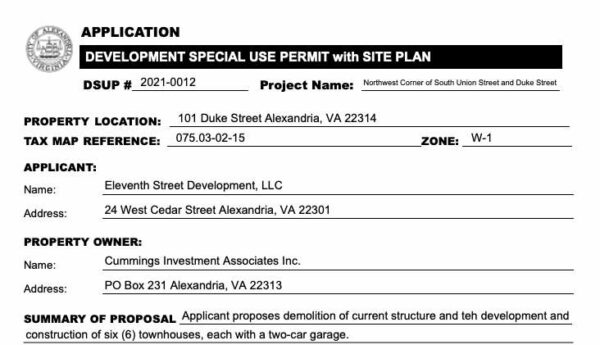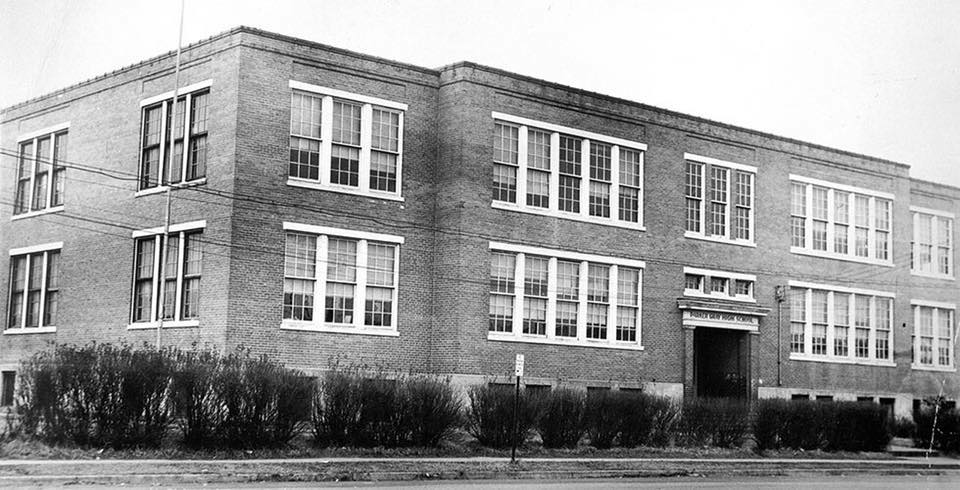
One of the most brought up terms in Alexandria development discussions is Development Special Use Permit — or DSUP — but despite being one of the building blocks for city planning is also one of the more confusing aspects of development.
Karl Moritz, Director of Planning and Zoning for the City of Alexandria, said a DSUP is a type of permit that comes up whenever a development could be seen as having a substantial impact on the neighborhood around it.
“When we have any kind of development proposal that has a potential impact on the neighborhood or city that is in any way complicated, we require a special use permit,” Moritz said. “That allows staff to do a more in-depth review for the potential for impacts, and come up with a customized approach for how to solve them.”
According to city documents, a DSUP is required for any project requesting:
- A modification of the parking ratios • A modification to the yard, landscape or open space requirements
- Increased building height or floor area ratio (FAR)
- Affordable housing bonus density
- Special requirements listed in the applicable zone in the Zoning Ordinance
Moritz said these are the cases that go to public hearings, and why they tend to draw discussion.
The alternative to a DSUP is a development site plan — DSP — which Moritz said is fairly rare. DSPs only need approval from the Planning Commission. One of the few notable examples of a DSP was the Alexandria Lighting Store move to the West End, where the project fit within all of the existing zoning limits of the site.
Rob Kerns, development division chief, said if a DSP meets all the city criteria for a site it is considered a by-right development. The Planning Commission would be required to show a deficiency — a requirement not met by the developer — to reject the project.
“That’s a project so simple that they have little potential for impact and we’ve already established a formula for how to handle that impact,” Moritz said. “That’s something like three single family homes, each on their own lot. But an apartment building that’s going to put traffic on the road? Those require special use permits and that kicks them into the special use category.”
Moritz said in the zoning ordinance, there are certain levels of density developers can get away with based on various zoning requirements, but exceeding that threshold requires a DSUP.
Another DSUP trigger is mixed-use development — developments where you’ll typically see residential or office space on higher floors and retail or restaurant uses on the ground floor.
“Some of the more commercial uses, if they want to incorporate them into a project, require a DSUP,” Kerns said. “Valet parking as well. Those are things where we have to analyze that. Mixed use is often one of the triggers for a DSUP.”
Moritz said parking is another DSUP trigger, with projects either supplying more or less parking than the ordinance requires.
Developments can get some allowances on things like density or parking — a longstanding process the city recently codified — but Moritz said there are some limits to that type of trade and the affordable housing swap is already at the fringes of what is allowed.
“But many in the public don’t understand the limitations of things we can ask for,” Moritz said. “There’s a certain legal framework that the state sets out that we need to abide by in processing development in terms of things we can ask from developers. The policies do achieve a lot — but sometimes community members think we can ask more.”
As an example, Moritz said the city is not allowed to ask for a development to contribute to building a sidewalk on the other side of the city. It’s a limit established by the Supreme Court in Nollan v. California Coastal Commission.
“There has to be a nexus and proportionality,” Moritz said. “We can’t ask for a freeway interchange for a single family home. The home isn’t creating an impact that justifies that.”
Moritz said the requirements around affordable housing are allowed by tying the impact of new development on the housing market. The city does still prioritize keeping affordable housing close to the developments when possible, however.
“We and many other jurisdictions have worked to make the connection between the provision of housing generally and new development, and the responsibility of that development to contribute generally to the affordable housing supply,” Moritz said. “The nexus is a little looser — in the sense that our housing economy and the geography of the housing market is broader than pedestrian improvements.”
Behind the scenes on the city staff side, Moritz said there are a few overall misconceptions when it comes to how the city handles development applications. The process is something like the famous survivorship bias example where the military studied where planes returning from combat in World War II were being hit — only to realize that the data would only be based around which planes had survived to return.
“People only see the [developments] that come to hearing, and usually by then staff is in support, so they think staff supports every idea a developer has,” Moritz said. “It’s a rare developer who is going to press for a project to go to hearing even with the objection of city staff. Usually by the time a project comes to hearing we support the project in general. What people don’t see is when people come in and say, ‘Oh, I want to build a meat rending plant in the middle of a residential neighborhood’ and we say, ‘No, you can’t, it’s not in ordinance and we won’t support it,’ and then they go away.”
Recent Stories

Good news, D.C. area. You can save money on your next home cleaning with Well-Paid Maids. It’s easy!
We offer a discount when you set up recurring cleans — and the discounts just increased this week!
For weekly cleans, get $30 off each cleaning.

Potomac Harmony is Back! Following a gap year of competing, then virtual rehearsals during the pandemic, followed by the well-earned retirement of our long-term director, a year of a director search, Potomac Harmony hit the regional contest stage in Concord, North Carolina in March for the first time since 2018! It was exhilarating, reaffirming, and rewarding!
The chorus hit all of its goals, the biggest of which was to have fun and sing our best on contest stage — we did both! Because we earned a score over 400 points, our new Director, Allison Lynskey, was awarded the Novice Director award, photo above. Additionally, one of our charter members, Jackie Bottash, was nominated for and honored with the Leadership Excellence award. It was a celebratory weekend!
What’s next? So much! We now look forward to upcoming performances, growing our membership, and expanding our musical product with new arrangements and an education component each week. It’s an exciting time to be part of this ever-growing ensemble!
Alexandria NAACP, Shiloh Baptist Church, DPC to hold City Council…
The Alexandria Branch of the NAACP, Shiloh Baptist Church, and The Departmental Progressive Club to hold the City Council Candidate Forum for ALL Candidates in the City of Alexandria Virginia. The event is Free of Charge and Open to The






